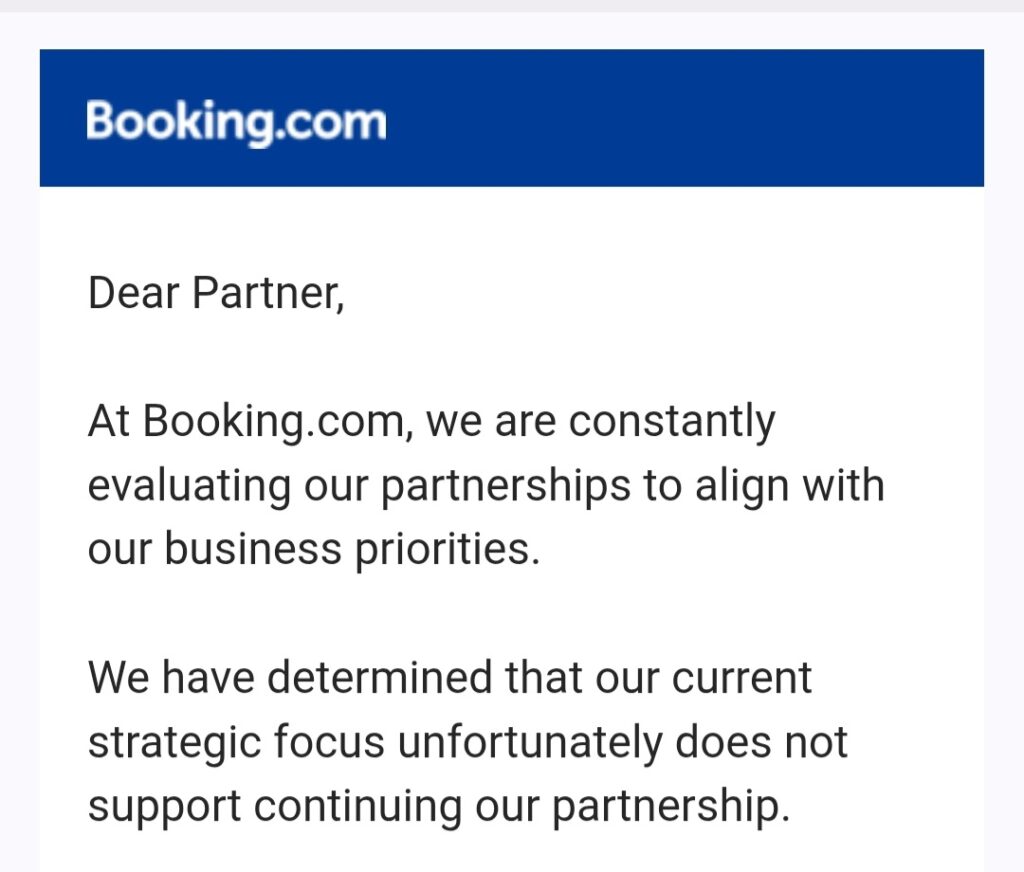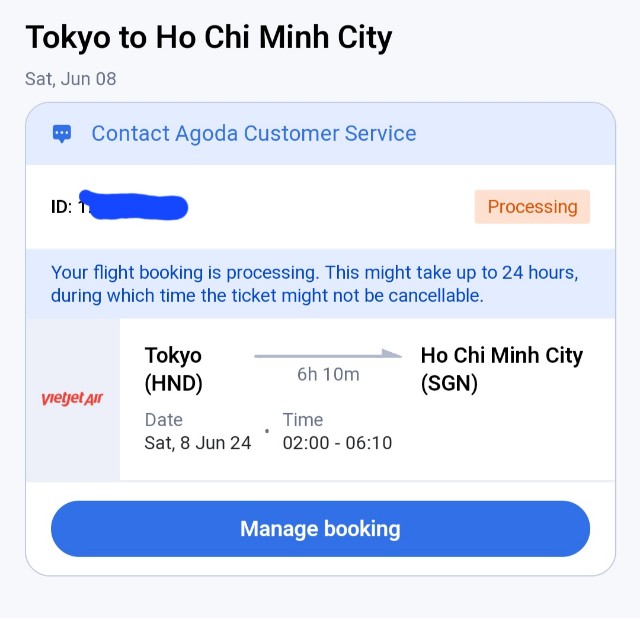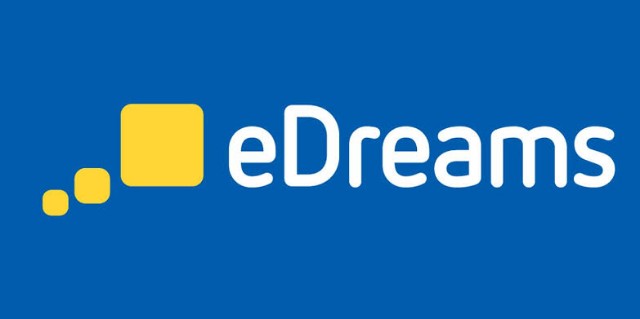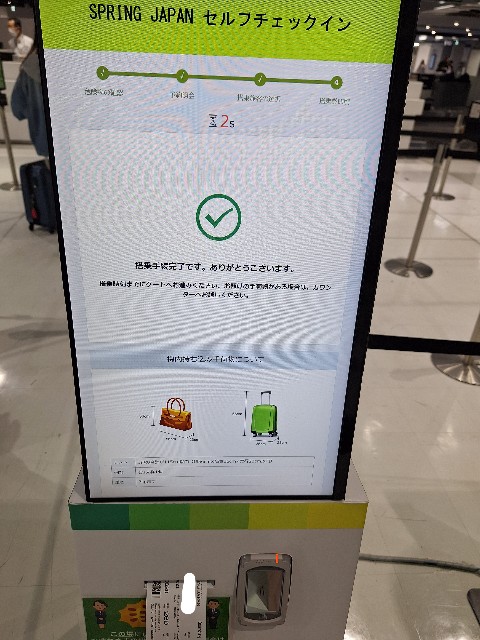If you’re a travel blogger or content creator who works with Booking.com, you might have recently received an email with the alarming subject line “Important Notice: Termination of Partnership” that made your heart skip a beat. I know mine did. After years of steady affiliate income from Booking.com—an essential revenue stream that has helped fund my travels and content creation—I woke up to find this alarming message in my inbox:

Important Notice: Termination of Partnership
Dear Partner,
At Booking.com, we are constantly evaluating our partnerships to align with our business priorities.
We have determined that our current strategic focus unfortunately does not support continuing our partnership.
This message serves as your 30-day written notice. After this period, we will exercise our legal right to terminate our Partner Agreement (Partner ID: XXXXXXX) for convenience on 20 June 2025.
My first reaction was panic. What had I done wrong? Was my content no longer valuable to them? Had I violated some terms I wasn’t aware of? The email felt like a bolt from the blue after years of what I believed was a mutually beneficial partnership.
If you received a similar email, you’re probably feeling the same confusion and anxiety. So I decided to dig deeper and share what I’ve learned about this situation to help fellow content creators navigate this unexpected change.
Understanding Why You Received the “Termination of Partnership” Notice from Booking.com
After careful analysis of the email and some research, I’ve concluded that this isn’t about individual performance or violations. This appears to be a broad strategic change by Booking.com affecting many (possibly all) of their direct partners.
The key phrase in their email is “terminate our Partner Agreement… for convenience.” This legal terminology suggests this isn’t due to any wrongdoing but rather a business decision on their part. Had this been about compliance issues or performance problems, Booking.com would likely have cited specific clauses or metrics that weren’t being met.
Further supporting this theory is the immediate pivot to their proposed solution:
How to continue working with Booking.com?
We invite you to apply to our Affiliate Program via Awin to continue working with us.
This isn’t so much a termination as it is a forced migration from Booking.com’s direct partner program to their program on the Awin affiliate network. The timing and uniformity of these notices suggest a coordinated, company-wide strategic shift rather than targeted actions against specific partners.
I’ve also connected with several other travel bloggers in my network, and many have confirmed receiving identical notices, regardless of their traffic volume, booking conversion rates, or geographical focus. This further confirms that we’re looking at a systematic change in Booking.com’s affiliate strategy, not isolated terminations.
What Does This Mean For Travel Bloggers? – The Practical Implications
Booking.com is essentially changing how they manage their affiliate relationships. Instead of maintaining direct partnerships, they’re shifting partners to work through Awin (or CJ for European users), a third-party affiliate network that manages many major travel and hospitality programs.
The email outlines the process:
How to join Awin:
Sign-up to the Booking.com Awin program using this link.
Once approved, please update all your tracking links using your new Awin link to continue earning commissions.
They also mention some potential changes to be aware of:
Under your new agreement, you will need to comply with the terms and conditions listed on the affiliate network program to continue your partnership with Booking.com. Please be aware that this might entail services and commission changes.
This last line is crucial – there may be changes to commission structures or other terms when moving to the Awin platform. For travel bloggers who have built business models around specific commission rates, this could significantly impact revenue forecasts.
Technical Implications
The migration to Awin means:
- All existing links will need to be updated – This could mean hundreds or even thousands of links across your content
- New tracking parameters – Awin uses different tracking technology than Booking.com’s direct program
- Different reporting interfaces – You’ll need to learn a new dashboard and reporting system
- Potential cookie duration changes – Commission attribution windows might differ on the new platform
- Payment schedule adjustments – Awin may have different payment thresholds and schedules than your current arrangement
Financial Implications
While the email doesn’t explicitly detail commission changes, my research into other programs that have migrated to third-party networks suggests we should be prepared for potential adjustments:
- Commission structure changes – Rates might be tiered differently or possibly reduced
- Network fees – Third-party networks sometimes take a percentage of commissions
- Different performance incentives – The bonus structure for high-performing affiliates may change
- Currency conversion considerations – If you’re outside the Eurozone/US, payment currency options might differ
Why Is Booking.com Making This Change? – A Strategic Analysis
While they don’t explicitly state their reasons, this move aligns with broader industry trends and likely offers Booking.com several strategic advantages:
1. Operational Efficiency
Managing thousands of direct partnerships requires significant resources – dedicated staff, custom-built partner portals, individual partner communications, and separate tracking systems. Moving to an established affiliate network can dramatically reduce these operational burdens.
2. Cost Reduction
By transitioning to Awin, Booking.com can likely:
- Reduce headcount in their partner management team
- Eliminate costs associated with maintaining proprietary affiliate technology
- Streamline payment processing across multiple currencies and regions
- Potentially negotiate volume-based fees with Awin that are lower than their current operational costs
3. Standardization and Scalability
Affiliate networks offer standardized tools and processes that can:
- Make it easier to apply consistent policies across all partners
- Provide more sophisticated tracking and attribution
- Scale more easily as their affiliate program grows
- Implement program changes more efficiently
4. Market Positioning
This move may also reflect Booking.com’s response to competitive pressures in the travel space:
- Other major OTAs like Expedia have already consolidated their affiliate programs on networks
- The post-pandemic travel landscape has intensified competition for direct bookings
- Cost-cutting measures have become increasingly important in the current economic climate
5. Data Strategy Evolution
Working through Awin might give Booking.com:
- More controlled access to affiliate data
- Better insights into cross-program performance (many affiliates work with multiple travel brands)
- Enhanced ability to benchmark their program against competitors on the same network
What Should You Do Now? – Action Plan After Receiving the “Termination of Partnership” Notice
Based on the email and my analysis, here’s a comprehensive action plan for travel bloggers affected by this change:
Immediate Actions (Within 7 Days of Receiving the “Termination” Notice)
- Apply to the Awin (or this very nice alternative… explained in the end of this post) immediately – Don’t wait until the last minute, as approval can take time
- Download all historical data from your Booking.com Partner Centre:
- Performance reports by month/quarter
- Commission statements
- Click and conversion data
- Any custom reports you’ve created
- Take screenshots of your current commission structure and terms for reference
- Check your pending commissions to ensure you know what payments to expect before the termination date
- Update your financial information in the Booking.com system to ensure final payments are processed correctly
Medium-Term Actions (7-30 Days Before Termination Date)
- Thoroughly review Awin’s terms and conditions – Pay special attention to:
- Commission rates and structure
- Payment thresholds and schedules
- Link attribution windows (cookies)
- Compliance requirements
- Prohibited marketing methods
- Create a spreadsheet to track all your Booking.com links across your site(s)
- Develop a systematic plan for updating links – Prioritize high-traffic pages first
- Consider using a link management plugin that can help update affiliate links in bulk
- Test new Awin links to ensure they’re tracking correctly
Long-Term Strategy Considerations
- Diversify your affiliate partnerships – This termination notice highlights the risk of over-reliance on a single platform
- Evaluate competitive programs – This might be a good time to compare Booking.com’s new terms with other OTAs
- Explore direct hotel partnerships – Some bloggers find success working directly with hotel groups
- Consider developing your own products – Decrease reliance on third-party commissions
The email highlights some potential benefits of the Awin program:
What are the benefits?
Dedicated account management team;
Booking details data access through the affiliate network platform;
Planification of CPA increase marketing campaigns;
Access to content, visuals, tracking links and reporting in one place;
Receive crucial insights on trends to optimize performance.
While these benefits sound promising, it’s important to approach them with a healthy dose of skepticism and verify whether the new program actually delivers these advantages in practice.
My Thoughts on This “Termination of Partnership” Change
As someone who has relied on Booking.com affiliate income for years, this sudden “termination” notice is certainly disruptive and anxiety-inducing. The 30-day notice period feels particularly short for those of us with hundreds of links across our sites that will need updating.
The corporate language of “termination” in the email subject line is unnecessarily alarming. What they’re actually doing is transitioning partners to a different platform, not truly ending the relationship. This poor communication choice has caused needless stress for content creators who depend on this income.
However, working through Awin might actually offer some advantages. Many travel bloggers already use Awin for other travel programs, so consolidating platforms could streamline reporting and payments. The network also has a reputation for reliable tracking and timely payments.
The concerning part is the vague mention of potential “commission changes.” Only time will tell if this migration will impact our earnings positively or negatively. Some early reports from bloggers who have already made the transition suggest commissions remain similar, but payment thresholds are higher on Awin.
I’ll be updating this post as I complete my own transition and learn more about the specific differences between the direct partnership and the Awin program.
You’re Not Alone – Community Response to the “Termination” Notices
If you received this “Important Notice: Termination of Partnership” email, remember that you’re not being singled out. This appears to be a company-wide strategic shift affecting many, if not all, of Booking.com’s direct partners.
In the travel blogging communities I’m part of, this has been a major topic of discussion over the past week. The consensus seems to be that while irritating and poorly communicated, this change is manageable and potentially even beneficial for those who already work with multiple affiliate programs.
I’d love to hear your experiences with this transition in the comments below. Have you already made the switch to Awin? Have you noticed any significant differences in the program terms or commission structure? Have you found effective ways to bulk-update your links?
Let’s navigate this “termination” and transition together as a community of travel content creators.
May 23 Update: Stay22 Might Be the Ultimate Migration Tool
Following the publication of this article, I received numerous comments from readers and conducted various tests based on their feedback. The results confirmed that Stay22 is an exceptionally capable tool that enables effortless and seamless migration. For detailed insights on my actual user experience, step-by-step implementation guide, and comprehensive review, please read my follow-up article below.
Related Article: Stay22 Review: The Solution to Booking.com’s Partnership Termination? Complete Registration & Implementation Process Explained



![[Coupon Available] Is Kiwi.com Safe? A Complete 2025 Guide to Booking Cheaper Flights | Pros, Cons & Hidden Costs](https://en.kosupatravel.com/wp-content/uploads/2024/12/20240521123736.png)


What a piece of crap! I also received the termination email, but being from Portugal there is no affiliate option. Neither through Awin nor CJ as I’ve read on other blogs.
As well as ending their affiliate program, I’m going to end my bookings with them and start booking on other platforms.
First of all, thank you for this post – it’s exactly what I was looking for after receiving the termination email.
Your analysis is clear and helpful. For our small travel blog about Sicily, this is definitely bad news, as Booking was one of our main revenue streams.
Here in Italy, the email didn’t mention any alternative affiliation options, so for us, this feels like a definitive break.
After this news, we’re seriously considering completely changing our affiliate strategy, shifting more towards entertainment and experiences (for example, with GetYourGuide).
Thanks again for the very helpful post.
I received this email too. What do you think about Stay22, seems a good solution as you don’t have to change links!
Correct. Stay22 is a great alternative to this because it’s an official Booking partner and remains like that. You can automatically convert all your booking .com links to Stay22 links and they will keep generating revenue.
Pingback: Booking.com Ends Direct Affiliates – Here’s What Bloggers Can Do - Travelling Buzz
Can you try Awin from this link? https://www.awin.com/us/advertisers/partner/booking.com#affiliate-programs
Europe is not there but it may work
Pingback: Stay22 Review: The Solution to Booking.com’s Partnership Termination – All Registration & Implementation Process Explained - Kosupa Travel
I received the same email on 21 May 2025. My heart skipped a beat when I saw the words ‘Termination of Partnership’, after which I checked online to see if it was a scam.
Once I had come to my senses, I started checking Awin and CJ (I’m based in the EU and am already part of both networks), specifically for Booking.com. I then realised that the new conditions were not as favourable as booking.com’s (4% commission, no cookie duration/same session referral window, etc.).
I then checked other alternatives and discovered that Tripadvisor, which is available on both Awin and CJ, has more favourable conditions than Booking.com, although they offer the same minimum commission of 4% on completed experience bookings. However, they also offer commissions on influence, so no booking is required for us to earn a commission, as well as a two-week referral window.
Tripadvisor’s ‘Commissions on influence’ according to https://www.tripadvisor.com/affiliates
Publisher #1: 170 clicks sent to Tripadvisor = $60/month
Publisher #2: 6,100 clicks sent to Tripadvisor = $1,720 per month.
Publisher #3: 870 clicks sent to Tripadvisor = $550/month.
Since most Booking.com properties are also listed on Tripadvisor, I am now switching my links to Tripadvisor (Tripadvisor does not only serves booking.com links, but other networks’ like vio.com, which means more competition, and potentially higher commissions). I might update a few of my Booking.com links to CJ/Awin affiliate links, but I’ll definitely give Tripadvisor a go.
To update the affiliate links for all my 300 listings, I’m using WP All Export/All Import. Stay22 could be a good option, but I’m reluctant to use JavaScript that changes links on the fly as it might not be 100% reliable.
Good luck to everyone out there, and remember that change can sometimes be for the better!
Pingback: Booking.com terminates many partnerships with content creators – Ezy Travel Hub
Pingback: Booking.com终止了与内容创建者的许多合作伙伴关系 - Mandarinian
Pingback: Booking.comは、コンテンツ作成者との多くのパートナーシップを終了します - nipponese.news - Nipponese